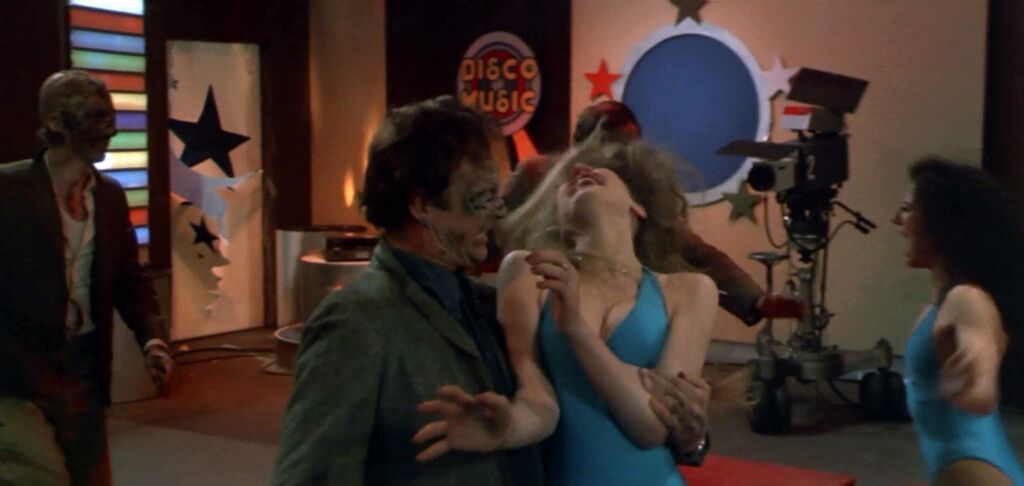
It took only a dozen survivors of a toxic waste spill to spread a deadly contagion through all of society. These survivors, mutated by radioactivity, have becomes vampiric zombies that require the blood of the non-contaminated to live. Their bite spreads the mutation, turns a person into a grotesque monster that thinks only of destruction. Around this doomsday circumstance two parallel narratives are put in place; one from the perspective of the authorities reacting to the epidemic and the other from the perspective of the everyman trying to escape armageddon.
General Murchison (Mel Ferrer) is the central figure of the authority narrative; a stoic beacon of reason and unrealized planning. On the other hand there is investigative journalist Dean Miller (Hugo Stiglitz). Director Umberto Lenzi clearly prefers the character of Dean Miller who embodies the skepticism and jadedness of Lenzi’s own cinematic style. Miller also has more to do than Murchison who never leaves the incident room during the course of the film.
Umberto Lenzi’s Nightmare City (1980) is a horrifically violent and gory outing. Lenzi never shies away from the spectacle of mutilation but rather he embraces it for its dehumanizing effects. As Nightmare City plays out the human form becomes progressively abstract until the point that a body seems to be nothing more than a collection of parts. This strategy, when coupled with Dr. Anna Miller’s (Laura Trotter) monologue about humanity’s own inevitable self-destruction, pinpoints the central thesis of the film. For Lenzi the human desire for the spectacle of violence is equivalent to the act of violence; schadenfreude becomes complicity.
As compelling a theme as this may be it’s nothing new to the zombie sub-genre of horror films. George A. Romero’s impeachable masterpiece of the genre, Dawn Of The Dead (1978), handled such themes with much more style and subtlety. Lenzi’s philosophical posturing in Nightmare City, while a welcome layer to the film, doesn’t exactly manifest itself complexly. It isn’t till the end of Nightmare City that Lenzi’s message even becomes apparent, and when it does it is immediately undermined by the unoriginal revelation that all which has occurred was little more than Dean Miller’s dream.
In the cycle of Italian produced zombie themed exploitation films Nightmare City is one of the more outstanding installments. The production values and special effects are all top notch and the performances, while trapped in two dimensional characters, are surprisingly affective. Nightmare City is not for the faint of heart nor is it an ideal entry point for those just discovering the Italian branch of zombie movies. However Nightmare City is worth seeing eventually.
